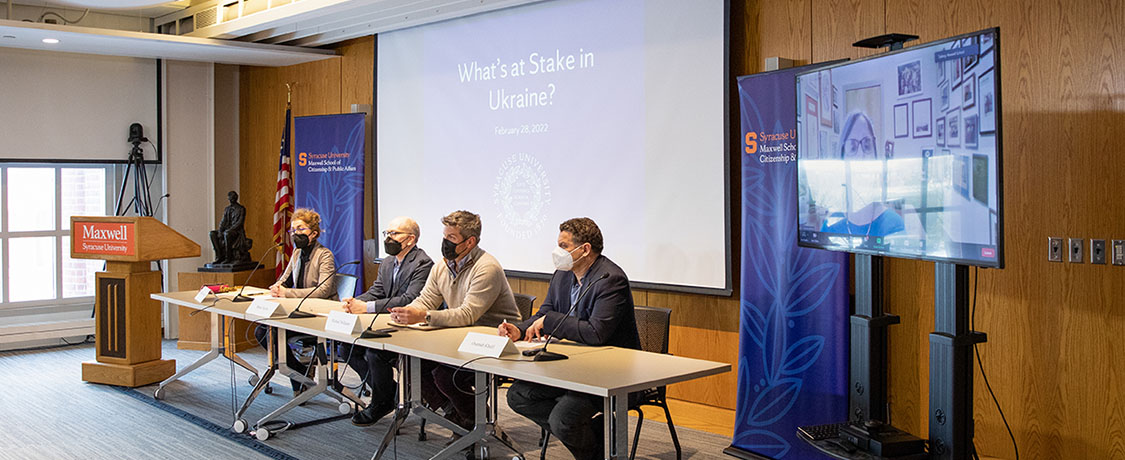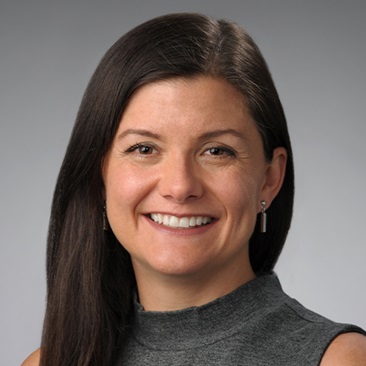
What’s at Stake in Ukraine? Maxwell Faculty Examine the Impact of Russia’s Invasion
March 4, 2022
On Monday, Feb. 28, the Maxwell School of Citizenship and Public Affairs hosted a panel discussion and Q&A titled "What's at Stake in Ukraine?" The event, held in the Dr. Paul and Natalie Strasser Legacy Room in 220 Eggers Hall, and online through Zoom, brought together respected faculty experts who examined the repercussions of Russia’s invasion of Ukraine.
Maxwell faculty members Brian Taylor, Michael Williams, Osamah Khalil and Catherine Bertini provided remarks on the conflict based on their areas of expertise. The event was moderated by Margarita Estevez-Abe, associate professor of political science and co-director of the Center for European Studies at the Moynihan Institute of Global Affairs.
Taylor, professor of political science and the author of “The Code of Putinism,” addressed the significance of these events for Ukraine and Russia. "They're fighting for their lives, they're fighting for their freedom, for their sovereignty, and for their independence," Taylor said. "It's fairly straightforward."
Williams, associate professor of public administration and international affairs and director of graduate programs in international relations, discussed what's at stake for the North Atlantic Treaty Organization (NATO) and Europe. He said the invasion has polarized NATO and the rest of Europe, with many of Putin’s former political allies in Europe adopting a pro-Ukrainian and pro-West stance. “In the span of less than a week, [Putin has] managed to seemingly overturn the German consensus on military spending and peaceful policy toward Russia. He’s managed to have both Sweden and Finland, neutral countries throughout the entire Cold War, get involved and send weapons to Ukraine.”
Khalil, associate professor of history, chair of the international relations (undergraduate) program and the Dr. Ralph E. Montonna Endowed Professor, discussed the implications for the U.S. He said the stakes for the U.S. are extremely high, and it lends us to go back to an idea of diplomacy and the need for diplomacy to end this crisis. "So at paramount is crisis avoidance between two nuclear powers. That is, should be, and should consistently be the issue. If you can't avoid the crisis, then the focus should be on resolution," he said.
Bertini, emeritus professor of practice of public administration and international affairs, and current Rockefeller Foundation fellow and Chicago Council on Global Affairs distinguished fellow, addressed the role the U.N. plays in the conflict. "These U.N. organizations are working with them on not only cross-border issues but issues within the country. I think we’ll see very strong, robust U.N. humanitarian operations working out and saving lives,” said Bertini, who referenced the U.N. High Commissioner for Refugee’s role in assisting Ukrainians who are fleeing their country.
Watch the video of the full event via You Tube.
You can also read the SU News article, "What’s at Stake in Ukraine? Insights Into the Invasion, De-Escalation and Short- and Long-Term Implications."
Published in the Summer 2022 issue of the Maxwell Perspective
Related News
Commentary

Mar 11, 2025
Commentary

Mar 7, 2025
Commentary

Mar 6, 2025
